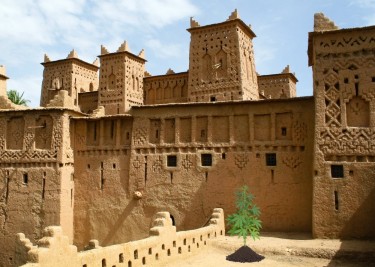Under the supervision of the National Agency for the Regulation of Cannabis Activities, established growers are now permitted to grow cannabis for export and industry in three northern provinces in Morocco.
Following the passage of a new cannabis law by parliamentary leaders last year, the Moroccan government granted ten licenses to farmers in the northern regions of Taounate, al-Hoceima, and Chefchaouen, where they will be allowed to cultivate and trade cannabis for industrial, medical, and pharmaceutical use. However, cannabis for adult usage remains illegal.
The 2021 Cannabis Law
In May 2021, the House of Representatives enacted the cannabis law with a resounding 119 votes in favor, 48 against, and no abstentions.
According to the law, cannabis may only be used legally for industrial and medical purposes, not for recreational use. Its goals include raising farmers' wages and defending them against drug smugglers who dominate the cannabis industry and smuggle it illegally into Europe. In some nations, medicinal cannabis treats illnesses like epilepsy and multiple sclerosis.
According to the needs stated by the authorized industrial operators, permits will be gradually provided to farmers. The National Agency for the Legalization of Activities Related to Cannabis is still exploring the cannabis market's potential to develop the industry further and encourage farmers to switch from illegal to legal, stable, and lucrative cultivation.
According to the news source, the 2021 cannabis regulation was created to protect local farmers from drug criminals who control the cannabis trade and transport it illegally to Europe. The law also aims to help the impoverished mountainous parts of Morocco, where marijuana was cultivated for decades but was outlawed in 1954.
Farmers in Morocco's northern region make up about 4% of the final crop value in the black market. According to a study from Cannavigia, a Swiss compliance software company that aids in tracking and tracing cannabis along the supply chain in Europe, government authorities assert that a controlled market will permit those growers to earn 12% under the new law. The law also suggests that farmers establish cooperatives in the northern regions. This is to help take responsibility for negotiating contracts with producers to protect their rights, engage in sustainable agriculture, and buy high-quality seeds.
In the challenging growing climate of the country's northern region, where other plants' cultivation is not feasible, the Moroccan government estimates that at least 60,000 households on 55,000 hectares (approximately 212 square miles) rely on cannabis farming. According to the Moroccan Ministry of Interior, the new law allows for the inclusion of other provinces in the controlled market. However, this depends on the interest displayed by national and foreign investors in enterprises associated with the cannabis manufacturing chain.
International investment
The ministry of interior-affiliated state organization's board of directors met for the first time in June. The ministry stated that the agency was entrusted with the implementation after the meeting. They are to practice the kingdom's plan for the cultivation, production, manufacture, export and import, transformation, and marketing marijuana products for industrial, medical, and pharmaceutical uses.
The agency also oversees and monitors all phases of this legalized cannabis business, from producing seedlings to product marketing and research support. Additionally, it is envisaged that it will aid in luring international capital into the production of cannabis goods, turn smuggling networks into a thing of the past, and legalize sustainable cannabis farming.
Morocco is ideally situated to become a leading legitimate exporter because it is right next to Europe. According to data cited in Moroccan media, cannabis plantations occupy about 55,000 hectares in the country's northeast region.
In research published last year, the Ministry of Interior estimated that the net income from cannabis grown for medical uses would be approximately $10,000 (110,000 Moroccan dirhams) per year. According to a research published by the Ministry of Culture and Communication media portal, Moroccan cannabis used for industrial and medicinal purposes may account for 10% to 15% of the market in Europe. This primarily would be foreign markets covering the Netherlands, the UK, Spain, and Germany. The country would earn approximately $420 to $630 million annually based on these two percentages.
The agri-food industry significantly influences the Moroccan population's social and economic development. Refferig to the most recent data from the World Bank, the sector accounts for 39% of employment, especially in rural regions, and accounts for 21% of the GDP.
Will Moroccan Traditional Farmers Reap The Rewards?
Farmers in Morocco's Rif Mountains, where large-scale hashish production has existed since the 18th century, worry that the government's campaign against illegal production and the snail pace of granting permits may result in missed opportunities. Historically, the area has provided roughly 70% of the hashish used in the European black market.
However, Morocco's domestic production and legalization initiatives are anticipated to claim a considerable portion of that market. Cannabis growers in Morocco are concerned about their future; Souad, a cannabis farmer in Azila, also believes that the government's legalization initiative has not yet reported any positive results.
Souad, who is in her 60s, continues to grow marijuana alongside her sons. Although she is skeptical of the likelihood of success, she wishes that legalization will contribute to the wealth of her family and the underdeveloped Rif Mountains region.
The demand for Moroccan hashish has shrunk dramatically as cannabis reform initiatives in Europe gain traction. According to a 2021 interior ministry research, Moroccan cannabis producers' annual income decreased from 500 million euros ($490 million) in the early 21st century to under 325 million euros ($319 million) in 2020.
Karim, a different producer in Azila, claimed that "the market has decreased substantially. Karim faced additional difficulties this year due to the worst drought the area had seen in decades. He could only cultivate a fraction of his family's land this year due to the lack of water. Farmers are witnessing stepped-up government efforts to stop illegal production as they start to control Morocco's cannabis market.
Conclusion
In its latest report, the UN Office of Narcotics and Crime warned against legalizing drugs, notably cannabis, for adult use. It claimed that while overall arrests for possession decreased, a rise in psychological problems, suicides, and hospital admissions ensued.
As with some other agricultural production, plant-based medicines can impact the soil and water, and their final manufacturing processes, including chemical processing and waste generation, can affect the air. This brought to light the environmental consequences of plant-based medicines. Morocco's water and land resources are under more stress due to population growth and climate change —which has reached around 38 million people—than ever before.







